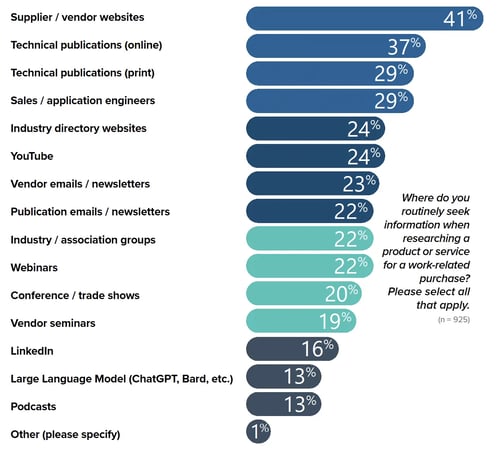5 min read
Strategy Before Tactics: Laying the Foundation for B2B Marketing Success
 Jennifer Dawkins
:
5/23/24 10:00 AM
Jennifer Dawkins
:
5/23/24 10:00 AM
There are just a few weeks left in the quarter and your marketing KPIs are not what you hoped. Website traffic? Stagnant. Lead generation? Crickets. The pressure to scramble and launch new tactics in the final hour can be overwhelming, often leading to a last-minute marketing blitz just to get SOMETHING out.
New blog article? Sure. Email newsletter? Why not. Google ad campaign? Let’s try it.

More often than not, these last-minute efforts are not aligned to a broader goal, the audience hasn’t been fully vetted, messaging is off, and success metrics are not defined… all resulting in time and effort spent without achieving any real results.
Early in my career, I remember a colleague saying, “We don’t have time to be strategic.”
When you’re pressed for time and have a million things to do – that is when you most need a sound strategy to guide you. That’s when you don’t have time not to be strategic.
Tactics-first marketing leaves you feeling drained, scattered, and ineffective. Instead, develop a data-driven B2B marketing strategy that gets results, so you can ditch the last-minute scramble and focus on tactics that actually move the needle.
6 Benefits of a Strategy-First Approach
In the rush to launch a product or get quick leads, it’s tempting to just start executing a barrage of marketing tactics without a clear plan. But this approach is almost always counterproductive.
Creating a comprehensive marketing plan helps ensure alignment on what you’re trying to do, who you are targeting, and how your various marketing activities work together to create an engaging experience for your audiences throughout their buyer’s journey. Here are a few ways that a strategy-first approach will improve your marketing execution.
- Internal Alignment: The process of developing your marketing strategy is a great opportunity to identify where marketing can support overarching business goals, agree on marketing focus areas and priorities, ensure alignment with sales, and establish what success looks like before you’re in the thick of it.
- Targeted Outreach: Developing a B2B marketing strategy involves deep dives into your ideal customer profile. Understanding what your audience cares about, what they struggle with, how they prefer to communicate, and where they get their information helps you create more relevant messages, develop more compelling content, and execute more effective outreach.
- Coordinated Efforts: A marketing plan gives you a big-picture view of all the ways your target audiences will interact with your brand, helping you be more intentional with messaging at each touch and ensure that all your marketing efforts, from content creation to website design, work together seamlessly.
- Smarter Resource Allocation: A strategic approach helps you invest wisely across marketing channels, prioritizing tactics proven to maximize ROI. It also helps confirm that you have sufficient headcount, agency support, and discretionary budget to execute planned activities and deliver expected results.
- Adaptability: No matter how well-crafted your marketing plan is, new opportunities or unexpected threats will arise. Your established marketing strategy will help you evaluate these opportunities and provide a foundation for adapting tactics to industry shifts and competitor moves when needed.
- Data-Driven Decision Making: By establishing what success looks like ahead of time, it’s easy to identify what activities to do more of, where you need to adjust, and which tactics may need to be abandoned altogether.
Building a Winning B2B Engineering Marketing Strategy
Developing a successful B2B marketing strategy doesn't have to be complicated. I've linked six essential components to developing a B2B marketing plan, and I’ve led this planning process with a wide variety of companies, big and small. Here are a few tips to help ensure success of your marketing strategy.
Involve the Right People in the Planning Process
While many marketing teams create their plans in a silo, the most successful strategies are created with representation from across the organization. In addition to marketing leadership, we recommend a planning committee with a representative from sales, customer service, and R&D, as well as an executive sponsor.
Make Your Plan a Living Document
Don’t put your marketing strategy on a shelf once it’s complete. Start every project kick off with the overall marketing goals, calling out the ones the project is supporting. Bring out those persona profiles every time you work on a content piece. Review the month-by-month plan at each status update meeting. And reconvene your planning committee quarterly to discuss progress toward goals and confirm the plan for the following quarter.
Leverage a Multichannel Approach
Once you’ve established your goals, campaign focus areas, and target audiences, map out supporting activities across multiple channels. Ensuring you have a variety of tactics that span owned, earned, and paid media channels helps you reach a broader audience, reinforce messaging with multiple touches, and create a synergistic effect that amplified your marketing impact.
Developing Effective B2B marketing Tactics for the Right Channels
So which tactics and channels are most effective in today’s marketing landscape? In our annual State of Marketing to Engineers research, we consistently ask engineers and technical buyers about the sources they use when looking for information about products and services.
While the need to prioritize your website is clear, this data shows that technical audiences are also relying on a wide variety of channels when researching a work-related purchase. Here are a few tactics across multiple channels for you to consider as you build out your plan.
Technical Publications
- Partner with Industry Publications: Work with relevant technical publications to get your content featured in articles, industry reviews, or sponsored content sections. This leverages the publication's credibility and reaches a wider audience.
- Pitch Thought Leader Content: Position your company's technical specialists as thought leaders by contributing guest articles or participating in expert panels for technical publications. This establishes your brand as a trusted resource within the industry.
- Targeted Advertising: Use targeted ad placements to reach engineers researching specific technologies or product categories.
YouTube
- Product Demos and Tutorials: Create clear, concise videos demonstrating your product's capabilities and how it solves customer problems.
- Customer Testimonials: Feature real customers talking about their experiences with your product or service.
- Industry Expert Interviews: Partner with industry influencers to discuss trends and challenges relevant to your target audience.
- Technical Q&A Sessions: Host Q&A sessions with your engineers to address common questions and showcase their expertise.
- Focus on Value, Not Hype: Focus on providing valuable, informative content that genuinely educates and assists engineers in their research process.
- Offer Exclusive Content: Incentivize sign-ups with exclusive content like white papers, webinars, or early access to new product information.
- Segment Your Audience: Don't blast generic emails to everyone. Segment your email list by industry, persona, or previous interactions to deliver highly targeted content.
- Personalize When Possible: Personalizing email content further based on their previous downloads or website interactions.
- Frequency Matters: Don't overwhelm inboxes. Determine an optimal sending frequency based on your audience's preferences and the value you're delivering.
Industry Events
- Engaging Booth Design: Design an interactive booth that showcases your products and services through live demos, interactive elements, or virtual experiences.
- Technical Experts on Hand: Staff your booth with technical experts who can answer in-depth questions, address specific challenges, and engage in meaningful conversations.
- Product Demos and Showcases: Schedule regular product demonstrations throughout the event. Highlight key features that address your audience’s pain points.
- Host Educational Sessions: Organize workshops, seminars, or technical presentations led by your engineers or industry influencers.
- Leverage Social Media: Promote your presence at the event on social media, using relevant hashtags and encouraging attendee engagement. Use the event to capture photos, videos, and testimonials to share on your social media channels.
- Thought Leadership Content: Share informative articles, white papers, and industry reports that establish your company's expertise and position it as a trusted resource.
- Engage in Groups and Discussions: Actively participate in relevant LinkedIn groups. Answer questions, provide insights, and build relationships with potential customers.
- Employee Advocacy: Encourage employees to share relevant content and participate in discussions. This leverages the collective credibility of your team.
- Targeted Social Selling: Use LinkedIn's advertising features to target specific demographics with personalized messaging that highlights solutions to their pain points.
- Showcase Customer Successes: Share case studies and client testimonials that demonstrate the value your product or service delivers.
Remember that marketing is a marathon, not a sprint, and the B2B landscape is dynamic. Don't get bogged down in the weeds of tactics without a clear plan. Take the time to develop a comprehensive marketing strategy that will guide your decisions and help you achieve your long-term marketing objectives. By embracing an agile approach and continuously measuring and improving your tactics, you can ensure that your marketing efforts are always moving you forward.
TREW is a marketing agency dedicated to reaching engineering and technical audiences through a range of marketing initiatives. Contact us today to learn more about the services we offer.
SUBSCRIBE TO OUR BLOG FOR THE LATEST UPDATES
Jennifer Dawkins
 Jennifer has been successfully marketing to engineers and scientists for nearly 20 years. Her marketing experience spans from defining company narratives and developing integrated marketing campaigns to building mutually beneficial partner relationships and maximizing performance in cross-functional teams. Jennifer holds a Bachelor of Journalism degree from the University of Texas at Austin. She is a native Austinite and when not at work, enjoys being on the lake or cheering on her sons’ soccer teams.
Jennifer has been successfully marketing to engineers and scientists for nearly 20 years. Her marketing experience spans from defining company narratives and developing integrated marketing campaigns to building mutually beneficial partner relationships and maximizing performance in cross-functional teams. Jennifer holds a Bachelor of Journalism degree from the University of Texas at Austin. She is a native Austinite and when not at work, enjoys being on the lake or cheering on her sons’ soccer teams.
About TREW Marketing
TREW Marketing is a strategy-first content marketing agency serving B2B companies that target highly technical buyers. With deep experience in the design, embedded, measurement and automation, and software industries, TREW Marketing provides branding, marketing strategy, content development, and digital marketing services to help customers efficiently and effectively achieve business goals.





